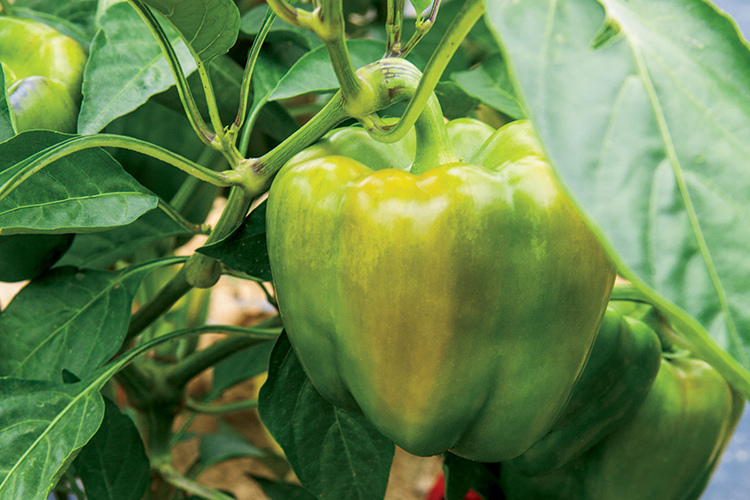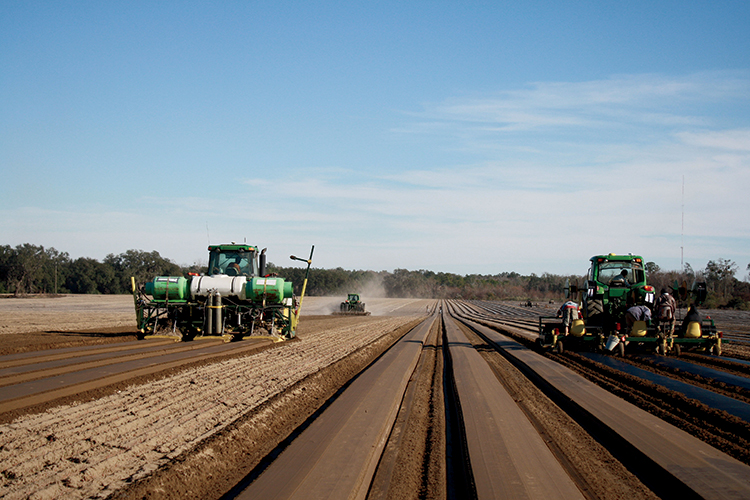Home > Georgia > Georgia Crops & Livestock > Planting and Packing Georgia Peppers
Planting and Packing Georgia Peppers

For Ken and Kim Corbett, farm and family come first. In fact, the pair take such care in their farm, that Kim almost gave birth to their oldest son, Justin, while transplanting bell pepper plants in the field in 1987.
Now the sixth generation of Corbetts to work on the farm, Justin and his siblings keep it in the family. They continue the tradition of growing high-quality produce, providing jobs in the Lake Park area and adopting new farming technology while connecting more personally with consumers.
Harvesting fresh produce takes a lot of hard work. Young people growing up nearby spent many summers working on produce farms, almost as a rite of passage. Before they married, Ken Corbett shuttled Kim to the family’s fields when she worked as one of the harvest “hands.”
Justin Corbett has done every job necessary on the farm, from long days operating planting equipment to countless early morning harvests. He says he benefits from the hard work his parents modeled.
“Mostly what I learned from growing up on a farm is a strong work ethic,” he says. “Your success [in vegetable farming] is based on your hard work, which you can control – and weather, which you cannot control.”
Ken Corbett Farm LLC employs 10 full-time and 350 seasonal workers to harvest 500 acres of vegetables in both spring and fall.
The farm focuses on bell peppers as its signature crop, but has smaller acreages of jalapeño, long hot, cubanelle and Hungarian wax peppers. The Corbetts also grow eggplant, yellow squash, zucchini and cucumbers.
Georgia’s bell pepper crop generated nearly $27 million in farm gate value during 2013, according to the National Agricultural Statistics Service. That ranks peppers among Georgia’s most valuable vegetable and melon crops, accounting for 12 percent of a $936 million vegetable industry.

According to USDA, per capita fresh bell pepper use increased some 67 percent since the 1990s, reaching a high of almost 12 pounds per American in 2012.
When the Corbetts started growing peppers in the 1970s, they sorted out lower-quality peppers and washed vegetables with a garden hose, delivering the best grades to a produce wholesaler. Their commitment to delivering high-quality vegetables hasn’t changed, but Corbett says new methods and technology allow them to guarantee large volumes of fresh, safe produce.
“Our produce is sanitized immediately, then graded and packed,” he says. “Then it is forcedair cooled within minutes of packaging. The product is held in a refrigerated warehouse until it is loaded directly onto refrigerated trucks from our refrigerated loading dock. The cold chain is never broken.”
It all happens in a completely enclosed climate-controlled 70,000 square-foot packing facility. Machines sort peppers according to size, using photographic-imaging technology. The farm maintains a stringent food safety certification, only packing vegetables grown there.
“We are adamant about having 100 percent control of the vegetables that we produce,” Corbett says. “It gives us peace of mind to know that from the day that it is planted, until it ships to the customer, our quality and safety measures are consistent in every package.”
Growing all the food they ship also helps the younger generation. “In a family business, you have vested management,” Corbett says. That means the decisions he is making are impacting his own future, as well as that of the family.
“Each generation can learn from the past as well as the next,” he says. “We need to keep up with technological changes while building from our past experiences.”



